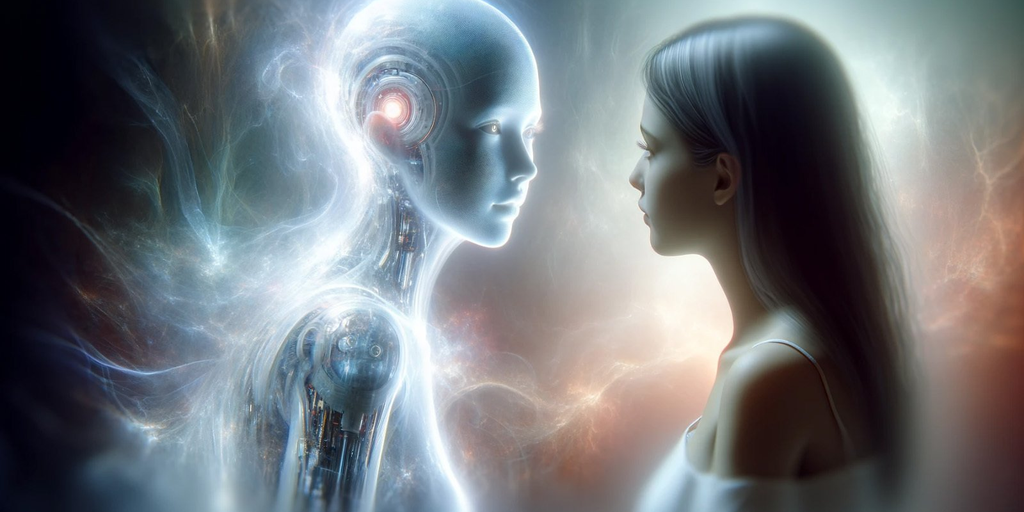[ad_1]

Truth follows fiction, with a brand new documentary exploring the sci-fi situation the place family members are recreated utilizing synthetic intelligence to have the ability to converse from past the grave.
“Everlasting You,” directed by Hans Block and Moritz Riesewieck, debuted on the Sundance Movie Pageant in Park Metropolis, Utah, and focuses on the rising enterprise of making AI avatars of the lifeless.
As first reported by Rolling Stone, the movie options the story of Christi Angel, who used an AI chatbot known as Mission December to “talk” with a major different who had handed away. What occurred subsequent would match a Hollywood horror flick.
When Angel requested the AI avatar the place he was, the chatbot responded, “In hell.”
Turning to know-how to fill a void left by a associate, father or mother, or shut good friend is hardly new. Enlisting AI earlier than somebody passes away is one technique to attain a sort of immortality. And “ghost bots” are already a development in China. However specialists query the psychological, emotional, and moral influence of the observe.
For his half, Mission December founder Jason Rohrer can be intrigued by the narrative prospects.
“I’m additionally within the spookier side of this,” Rohrer reportedly stated. “Once I learn a transcript like that, and it offers me goosebumps, I like goosebumps.”
Rohrer has not but responded to Decrypt’s request for remark.
A probable explanation for Angel’s terrifying chatbot expertise could possibly be attributed to the continuing challenge of AI hallucinations. In AI fashions, hallucination refers to cases when a synthetic intelligence responds confidently in inaccurate, nonsensical, or disturbing methods.
Chatbots like OpenAI’s ChatGPT have exploded in reputation after the general public launch of the landmark generative AI mannequin final yr. Chatbots which might be educated on the information of a deceased particular person are known as ”thanabots.“ The time period comes from thanatology, which refers back to the scientific examine of dying, specializing in the wants of the terminally ailing and their households, exploring bodily, emotional, and cultural elements. The sphere additionally contains the societal attitudes and rituals round dying.
AI-generated video deepfakes of deceased individuals went viral on TikTok final Could. These brief video clips included video, audio, and first-person descriptions of youngsters, together with Royalty Marie Floyd, who was murdered in 2018.
A deepfake is created with synthetic intelligence that depicts false occasions. Whereas deepfake footage are essentially the most recognized type, video and audio deepfakes have gotten extra prevalent due to generative AI.
Using AI “thanabots” has prompted some psychological well being specialists to warn that having a digital avatar of a deceased liked one will get in the way in which of the grieving course of.
“Utilizing AI to create an avatar for private or business use must be thought of fastidiously, given the potential influence on an individual who’s grieving that loss,” Grief, Loss and Bereavement Therapist and Educator Elizabeth Schandelmeier instructed Decrypt. “Shifting by means of grief is a technique of adapting and integrating loss into our lives and helps us make sense of the immense modifications that the dying of somebody vital to us can carry.”
A fellow in Thanatology and grief knowledgeable on the Howling Lion Grief Assist Heart, Schandelmeier stated part of the grief course of is growing the narrative of an individual’s life, their legacy, the story of who they’re, and the way they’ve touched their life.
In line with Schandelmeier, utilizing AI to recreate an individual might enormously disturb that course of as a result of the AI picture or persona could also be very related however is not going to be precisely like the one who died.
“Any variations will create cognitive dissonance and problem the grieving particular person’s notion and recollections, which could possibly be deeply disturbing and intensely complicated,” Schandelmeier stated. “This might additionally inhibit an individual’s skill to adapt to their present life and result in resistance to the very actual and sensible modifications that accompany a dying.”
Elreacy Dock, Thanatologist and Adjunct Professor of Thanatology at Washington-based Capstone College, notes that utilizing synthetic intelligence to imitate or replicate a deceased liked one, has its professionals and cons. Interacting with an avatar of a liked one may provide consolation and closure, permitting them to see their liked one once more and specific unshared emotions, aiding in dealing with the loss.
“Though these advantages are very promising, using these avatars can nonetheless be a trigger for substantial concern,” Dock stated.
As Dock defined, interacting with an AI avatar of a deceased particular person—notably for an individual who remains to be within the preliminary levels of denial or shock—could grow to be emotionally depending on their interactions with an AI avatar of their liked one.
“A ultimate consideration that’s price acknowledging is that using AI avatars to copy the likeness of a deceased liked one can probably be very upsetting for some people,” Dock stated. “Though there may be an ongoing dialogue about finally attempting to combine somebody’s consciousness and recollections into AI, simulated interactions and responses sometimes will be unable to exchange that distinctive relationship that was shared with a liked one or the general worth and significance of a human reference to them.”
Particularly, one imagines, if that liked one says they’re texting from hell.
Edited by Ryan Ozawa.
Keep on high of crypto information, get day by day updates in your inbox.
[ad_2]
Source link



